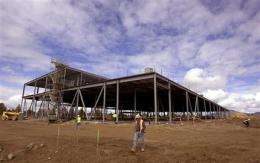Greenpeace not LOL over Facebook footprint

(AP) -- After an emotional breakup with the timber industry, Prineville, Ore., was thrilled to get friended by Facebook. The social networking site chose the high-desert timber town of 10,000 to take advantage of its cool nights and dry air in hopes of making its first-ever data center an energy efficiency landmark. But the concept failed to impress Greenpeace.
In a report posted on the Internet last month, the environmental group praised Google and Yahoo for tapping hydro power - but challenged Facebook for building in coal country.
The feud shows how hard it can be for the computing industry to meaningfully reduce its environmental footprint. It can add to its green glow through energy efficiency, but Greenpeace argues that IT companies should care more about where the power comes from.
As the nation works to green up the grid to combat global warming, data centers are demanding more energy than ever. A 2007 Environmental Protection Agency report estimated that from 2000 to 2006 data centers doubled their consumption to 61 billion kilowatt hours. That's 1.5 percent of the grid and enough for 5.8 million households.
"If you want to really be responsible for your carbon footprint, you should be trying to provision your electricity supply with renewable energy as much as possible," said Greenpeace climate policy analyst Gary Cook.
In what might be considered adding insult to injury, Greenpeace even created a special Facebook page with a smokestack logo to say the data center would be a greenhouse gas hog.
But the complex equation that goes into how much something costs still counts, said Ken Patchett, who was hired away from Google to run Facebook's data center in Prineville.
"At the end of the day, Facebook is like any other major competitive business," he said. "We do have to manage to our bottom line."
Facebook, Yahoo, Google and others have become fans of the Northwest as they build more warehouses filled with computers to store data.
It is close to undersea cables with direct links to growing markets in Asia. Power costs are low and stable. High-speed bandwidth is as close as the nearest railroad line. The climate makes it cheaper to keep computers cool. Communities like Prineville, struggling to reinvent their economies, give generous tax incentives.
Facebook said in choosing Prineville, the energy saving features allowed by the climate outweighed the source of the electricity, and that the utility PacifiCorp is greening up its power sources, expanding wind power to 2,000 megawatts by 2013. It currently gets 58 percent of its power from coal, and only 21 percent from renewables.
PacifiCorp offers a green power option, but it costs more. Facebook has not signed a contract yet, and is not saying if it will go for the "Blue Sky" option.
In most data centers, cooling the servers takes nearly as much electricity as running the servers themselves. Facebook hopes its new cooling system will take only 15 percent as much power as the computers. Facebook is also shooting for a gold rating from the green building standard known as LEED.
The climate is important. Even in summer, nights are cool. The center can take in outside air for free. When temperatures rise, a high-tech swamp cooler blows dry air over water, and the evaporation lowers temperatures. In winter, hot air from the servers is blown into office space.
"The way we are managing it provides for a lower carbon footprint as well as a lower monthly bill for power," Patchett said.
Like Facebook, Yahoo had a cool climate on top of its list when it chose Lockport, N.Y. But it also tapped local hydro generation for power.
It is building a patent-pending system known as the Yahoo Computing Coop - it sort of resembles a chicken coop - that it hopes will beat Facebook's efficiency, using only 10 percent for cooling as for running servers. Louvered sidewalls allow wind to blow cool air into buildings, which are long and narrow to facilitate venting hot air through the roof.
"We are all working together to really nail down what does an efficient data center look like ... so we can demonstrate leadership," said Christina Page, Yahoo director of climate and energy strategy.
Beyond changes in the mix of energy sources on the grid, the IT industry can reduce carbon emissions through the smart grid, smart buildings and more efficient heating and cooling, she added.
Jone-Lin Wang, managing director of the global power group for IHS Cambridge Energy Research Associates, said that's not realistic. Renewables account for less than 4 percent of the grid. Wind, solar and hydroelectric are all intermittent, needing a backup, such as natural gas. And they tend to demand a premium price. Meanwhile, coal power is declining on its own, because many plants won't be able to meet tightening pollution controls.
She added that over the next 10 years, renewables will grow to just 7.5 percent of the grid, primarily because 30 states have adopted Renewable Portfolio Standards setting targets for growing renewable power.
All this gets little attention in Prineville, which has watched its sawmills wink out as logging declined over the years. Then came the recession, leaving ghost subdivisions around town and Crook County with the worst unemployment in Oregon, a seasonally adjusted 14.9 percent.
People are hungry for jobs that will keep young people from moving away, and the 200 construction jobs and 35 permanent jobs at the data center are a step in the right direction, said Greg Lambert, owner of Mid Oregon Personnel Services.
"Most people kind of view Greenpeace as kind of a fly on the butt of an ox," said Lambert.
©2010 The Associated Press. All rights reserved. This material may not be published, broadcast, rewritten or redistributed.



















